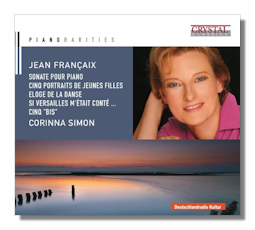
The Internet's Premier Classical Music Source
Related Links
- Françaix Reviews
- Latest Reviews
- More Reviews
-
By Composer
-
Collections
DVD & Blu-ray
Books
Concert Reviews
Articles/Interviews
Software
Audio
Search Amazon
Recommended Links
Site News
 CD Review
CD Review
Jean Françaix

Piano Music
- Cinq Portraits de Jeunes Filles (1936) [12:44]
- Sonata (1960) [9:02]
- Eloge de la Danse (1947) [12:02]
- Si Versailles M'Était Conté… (1953?) [15:38]
- Cinq "BIS" (1965) [9:22]
Corinna Simon, piano
Rec. 18-20 April 2012, Siemensvilla, Studio Gärtnerstraße, Berlin
Crystal Classics N67091 (or Delta N90091) 58:48
Jean Françaix (1912-1997) was one of the last century's most delightful composers. His great inspirations were Mozart and Ravel, which sounds like an odd couple, but these influences, combined with his love for jazz and French popular music of the 20th century, made for a composer whose voice is bright and fresh, whose demeanor is always charming, and whose days never seem troubled by clouds.
What is this piano music like? Well, it's like if Ravel and Gershwin walked into a bar, and were joined by a tipsy Poulenc, and they all heard a Piaf tune on the jukebox. The album kicks off with Five Portraits of Young Girls, describing their personalities (one's tender, one's modern, and so on). The last piece is a suite of five encores called Five Encores, the titles of which simply must be passed along:
I. To appetize the audience
II. For sentimental ladies
III. In case of success
IV. In case of triumph
V. In case the audience goes wild
Now how can you resist a composer like that? There's a great deal of variety here, actually, from a tenderly bluesy sarabande in the Praise of Dance suite (track 14) to the slightly-more-formal Sonata, with the tiniest hint of dissonance and a toccata finale. The longest single work is a suite from the movie Royal Affairs in Versailles, which featured Claudette Colbert, Édith Piaf, Jean Marais, Orson Welles, and an uncredited Brigitte Bardot. (The booklet misnames "Claudette Gilbert.") The piano arrangement is Françaix' answer to Ravel's Tombeau de Couperin, though the final march's setting of "La Marseillaise" sounds almost as if done by Rachmaninov.
Some listeners don't have much patience for Françaix. He's rather monotone; certainly nothing here has the emotional depth of Ravel or Poulenc at their best, and the untroubled cheeriness is not fashionable among today's music scholars. (I wish it were, a little bit.) But that was his nature, and this was his music. For all that he credits Mozart as an inspiration, I wonder if he isn't closer in spirit to Haydn. If Haydn had been a product of 1920s Paris, can you imagine his music being significantly different from this?
Corinna Simon is a great advocate of the works on the disc. She overdubs two tracks in the Versailles suite which require four hands, including a portrait of Louis XV which is a bit like French royalty meets "When the Saints Come Marching In." She does beautifully in the slower, bluesier tracks, while meeting all the composer's technical demands and always being as playful and witty as she needs to be. The virtues which informed her recent Gershwin CD are here too.
If you like this sampler, Martin Jones has a three-disc set of the piano works on Nimbus NI5880. His performances are also excellent, and include additional works like the Promenade of an Eclectic Musicologist. Let's hope that the revival is in full swing and more albums come our way. Let's also hope they uphold the high standards set here.
Copyright © 2015, Brian Reinhart




















